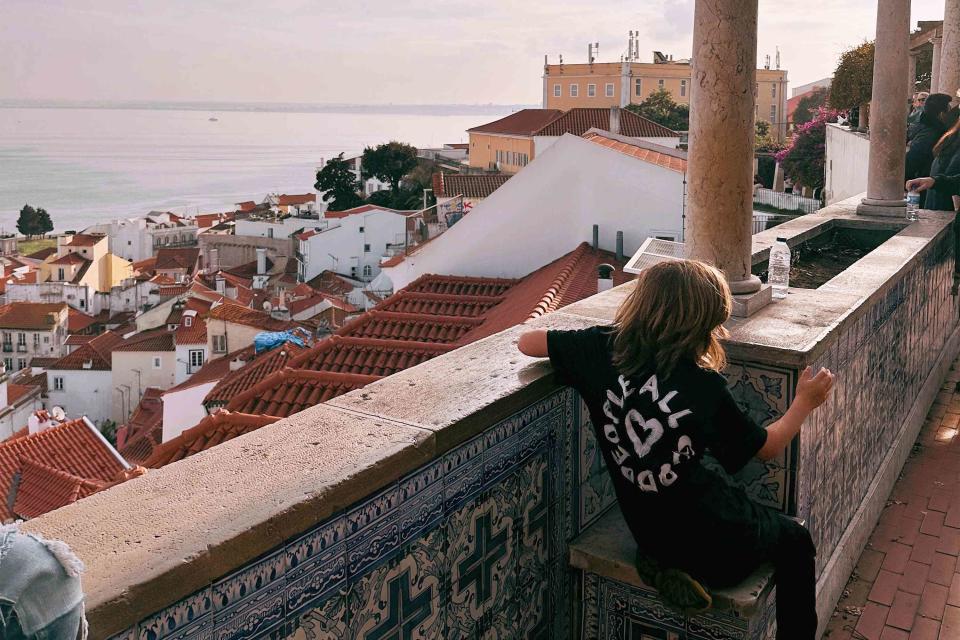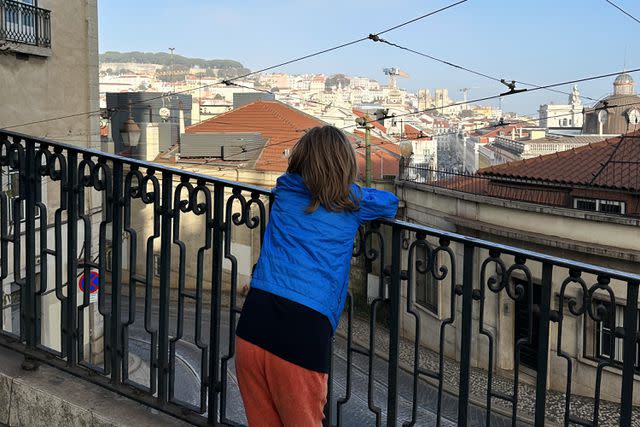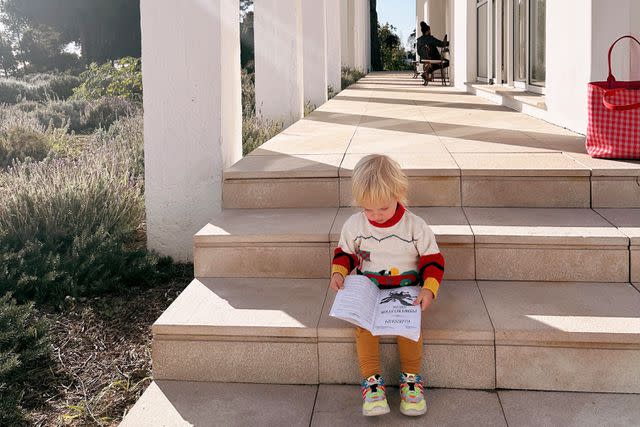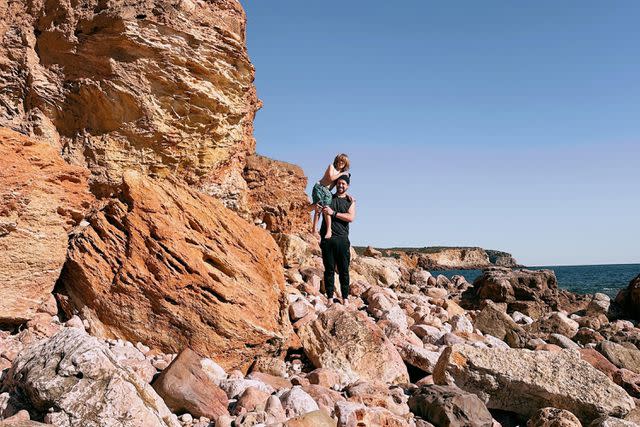Why I Pull My Kid Out of School to Travel the World
I may get "in trouble" with the attendance police, but I have no regrets because my kid learns just as much—if not more—from traveling.

Amelia Edelman
Fact checked by Elizabeth Brownfield
We are in Lisbon’s historic Chiado district, and my 1-year-old is chowing down on Bacalhau à Brás—codfish with potatoes and eggs, bless his heart—while my 8-year-old clamors for his daily Pastéis de Nata, Portuguese custard tarts, which he sources down the cobblestoned street from our current home base at Martinhal Chiado. I take the moment of relative chewing-quiet to check my voicemail, and there it is, in the usual scolding Tennessee accent: “Your child has an unexcused absence. Children who miss school miss out! They fall behind in reading, math....”
I delete it before it finishes. I’ve heard this recorded voice message dozens of times since my older son started public school: He is a truant, his frequent absences are being tracked, I need to schedule yet another meeting with the attendance counselor...all of this is bad. And yet.
My kid, the child of a touring musician and an editor who covers travel, is at the top of his class. In fact, if standardized testing results are to be trusted (which is debatable), he's one of the smartest 8-year-olds in the US. And even if he weren't, there would still be so many incredibly valid reasons that he should—that any child should—be allowed to miss school.
We've covered the most important of these many valid reasons before: Public school students should not be penalized for taking mental health days or having a chronic medical condition that necessitates multiple absences. Nor should parents be pressured to push kids to attend school while sick, simply in hopes of achieving that sought-after, totally arbitrary perfect attendance award. These are all crucial reasons for our education system—and its funding sources—to reexamine the pressures and rewards around attendance. And I'd like to add yet another argument to this list: Available learning opportunities outside school walls should count as excused, too.

Amelia Edelman
I'm a child of public schools. I have deep respect and value for my own public school education, as well as my kids'. But unlike Kid Me, my kids have access to something I never had: the world.
I left the US for the first time as an adult; my 8-year-old has been to four continents. When he receives scolding messages from school, it's not because he's slacking off and falling behind on his social studies unit; it's because he's learning about ancient cultures on the Greek island of Paros or in the Mayan temples of Belize. Or he's helping out cooking some traditional recipes in Marrakech, or he's tasting fermented shark (protein!) in Reykjavík. Or he's moonlighting as a roadie, living off a tour bus with his dad's rock band and helping haul instruments backstage on the coast of Mexico.
These travels are all an incredible privilege. A privilege that is due to the luck of my son's birth and of his parents' chosen career paths—as well as the sheer will of our family's priorities. (Have we sold a car to book a trip? Perhaps.) But is the opportunity to access global education—"worldschooling" as some call it—something we should be turning down simply to meet DOE attendance rules?
On our current trip to Portugal, the learning began as soon as we took off. We flew TAP (Transportes Aéreos Portugueses) Air Portugal, which offers a variety of educational programs among its in-flight entertainment throughout the six-plus hours direct from Boston to Lisbon. My kids streamed Portuguese music, watched beautiful footage of the country's geography, and followed along on a surprisingly easy-to-learn Portuguese language 101 video course. By the time we landed in Lisbon, my son was shouting "olá" (hello) and "estou com fome" (I'm hungry) like he'd been studying for months. The TAP flight also gave both my kids their first tastes of Portuguese food, setting them up for success diving into the more unusual options by the first dinner post-landing (see earlier re: codfish).

Amelia Edelman
From there, my kids hit that Portuguese ground running—and with far fewer requests for cartoons than on a typical school day, when my older son in particular comes home drained from academics and just wants to zone out to Ninja Turtles. Here, instead, he and his brother learn about the history of the 1755 earthquake that devastated Lisbon, and how the building housing our now-favorite restaurant, Bar 1855, was erected in 1855 during the city's rebuild and renaissance.
We take a tuktuk (auto-rickshaw) tour around the historic city center, and my son asks our rickshaw driver endless questions about the two small businesses she runs, both the tours and an education nonprofit in the neighboring surf town of Carcavelos. My kids run their hands over countless azulejo tiles, the brilliant blue tin glaze impossible not to touch. They chase after trolleys, kick balls with Portuguese kids, and look over the city from Miradouro da Senhora do Monte, remarking that it's "even more colorful than San Francisco."
About halfway through our trip, we leave Lisbon for the southern Algarve coast. It's a three-hour drive, which is no small feat with a toddler and a second-grader. But the hours fly by as we listen to podcasts about the region's history—podcasts that would certainly not have kept my kids' attention had we tried to listen to them at home rather than while driving through the very fields and rocky coastline where these historical battles had been fought and discoveries made. By the time we arrive at Martinhal Sagres, our second home-away-from home of the week, the kids are ready for some serious cliff-climbing before chowing down on even more seafood. My partner and I are ready for the vinho verde.
Every hotel we stay at on this trip has a kids club run by locals, and both of my kids are fearless attendees, waving "tchau" to us so they can spend a few hours doing handicrafts and, of course, practicing their Portuguese. On our final day in the Algarve, we end up at Cabo de São Vicente, the craggy point outside Sagres that is the most southwestern point in all of Europe.
"This is the end of the world," my son says, matter-of-factly. I agree that it does seem like that; it's so isolated. No, he explains, it used to be called that, for real. Until 14th-century European explorers began venturing further afield into the Atlantic, this was the furthest they had ever been. It was known as just that: The End of the World. Did he learn this in school? I ask. Nope, he learned it from one of the hotel employees he befriended. So much for falling behind in social studies, I laugh.
We close out our trip back in Lisbon, spending our final night at the modern Martinhal Oriente, which is a hotel on the city's eastern edge that doubles as a living contemporary Portuguese art collection. My son and I debate the merits of our favorite artists on display—he loves Bordallo II and his "Big Trash Animals" and I can't get enough of Graça Paz. (Could either of us have named a Portuguese artist, period, two weeks ago? Probably not.) I also can't get enough of the food and wine at Terrace, the hotel's restaurant, whose gourmet-for-kids menu wins the award for getting my picky kid to try some of the more interesting things he's ever eaten, including tomato tart and a deliciously bizarre orange blossom dessert. Baby brother eats it all with gusto, as usual.
But for my 8-year-old, the #1 draw of this particular stay is its location down the block from the famed Oceanário de Lisboa—Lisbon's aquarium, which houses 8,000 sea creatures—and even holds undersea concerts for babies on weekends. Both of my kids spent hours exploring the various ocean habitats, with big brother always in the lead and usually spouting endless facts about garden eels.

Amelia Edelman
When it's all over and we finally land back home in Tennessee, a happy yet jet-lagged mess after flights from Lisbon and Boston, there is a letter waiting in the mailbox from Metro Nashville Public Schools. My son has more than five unexcused absences and we, as a family, will face consequences. Fortunately, this is not my first truancy rodeo.
I walk to the elementary school with my son the following morning: me with my letter of scolding and my appointment with the attendance counselor, him abuzz with excitement, clutching azulejo souvenirs. He can't wait to tell his friends and teachers all about his adventures in Portugal.
I've had these appointments before and I'm hopeful this one, too, will not end in anything too serious. But I can't help feeling a pang of guilt for yet again pulling my kid out of school to schlep him across the world. Did the incessant voicemails with the Southern twang have some truth to them? Is he "missing out" and "falling behind"? If not in academics, are our travels affecting, say, his friendships back home?
We arrive in front of the school and as I'm heading into the office, my son is immediately greeted by half a dozen friends. He has classmates of every background and skin tone—the true boon of city public schools. One girl, who emigrated from Brazil, runs up and shouts "I MISSED YOU!"
"Desculpe," my son replies slyly. "Eu só falo Português." I'm sorry; I only speak Portuguese.
The little girl's mouth falls open. She erupts in laughter and throws her arms around my son.
I think his friendships are going to do just fine.
For more Parents news, make sure to sign up for our newsletter!
Read the original article on Parents.


